
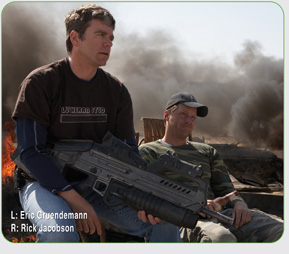
Early on in my interview with Eric Gruendemann and Rick Jacobson, I realized it was better to step aside and let them roll. Staccato streams of consciousness and off-the-wall retorts are the norm for these kindred spirits who finish one another’s sentences and embellish an idea like identical twins sharing the same consciousness. Comfortable in their skin, they freely employ their raucous humor, which plays a large part in their latest film, the aptly titled, Bitch Slap - a modern-day exploitation extravaganza that Jacobson and Gruendemann wrote and produced and Jacobson directed.
But don’t get the wrong idea. These scrappy raconteurs are true gentleman, capable of shrewd insight and sporadic moments of reflection that was mostly evident when they sat down at the Greenlight offices to discuss the poster art for their upcoming theatrical release.
From 1993 to 2000, Eric served as Co-Executive Producer and Managing Director of Pacific Renaissance Pictures, the company he founded with legendary filmmakers Sam Raimi and Rob Tapert. He oversaw virtually all creative and production aspects on the groundbreaking series Hercules - The Legendary Journeys, Xena: Warrior Princess, as well as the half-hour series Cleopatra 2525, Jack of All Trades, Young Hercules and the two-hour telefeatures Young Hercules and Amazon High. All told, Gruendemann has produced nearly 300 hours of television and directed the two highest-rated episodes of Jack of All Trades.
With fifteen feature films to his credit, Jacobson transitioned to the small screen, becoming a series director on popular television shows Baywatch, La Femme Nikita, Mortal Combat Conquest and She Spies, to name a few. From 1996 to 2001, Jacobson began directing Hercules - The Legendary Journeys and Xena: Warrior Princess for producers Sam Raimi, Rob Tapert & Eric Gruendemann. Jacobson went on to helm more episodes of Xena than any other director in the series’ six-year run. Raimi/Tapert called upon Jacobson again to direct the pilot episode of the effects heavy Cleopatra 2525, and then in 2009 for the pilot of their new graphic novel-inspired series, Spartacus: Blood and Sand. With over 100 episodes of television accomplished, Jacobson returned to directing features in 2007 with the independent film Bad Guys.
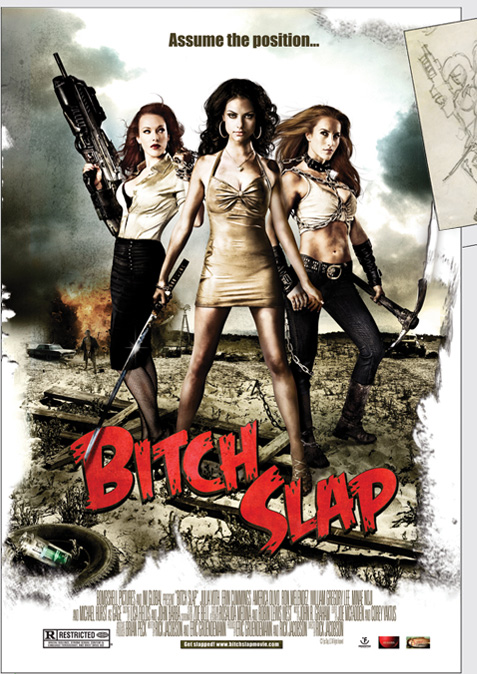
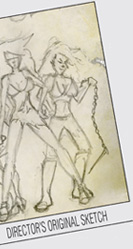
Darryl: Typically, the distributor handles the development of the key art (poster) for a film. So why did you guys bypass this process and create the artwork?
Eric: Out of necessity, because we’re the studio, as well.
Rick: Right off the bat, this film was designed to be an easy sell. When we first started knotting around the whole thing, we’d sit across the table and kind of chuckle to each other and go, “Oh wow, I can just see the poster, you know its just three hot chicks, all torn up. One’s got a big gun, there’s a shovel, dirt, sun, sweat, and we thought; who wouldn’t want to see that movie? In fact, I just kind of drew a little stick figure sort-of-thing, and I think I even have it to this day - but we both laughed and said, “Yeah that’s the poster.” So it’s knowing what makes a person stop when they’re walking through the DVD section. What grabs their eye? We understand the importance.
Eric: We do know the importance of it, and in fact, that’s why we came to you guys. The incredible Greenlight Designs, even before we started shooting.
Thanks for the plug - but where I’m going with this is that you guys took the initiative before you had distribution or finished cutting the film. The initial artwork was developed to promote your film at Comic-con, correct?
Eric: Correct. At that point, we thought that we were six months away from finishing the film. So we thought, let’s spring onto the world what’s happening here. So we took the girls and the artwork and went gangbusters.
What was the response?
Eric: Overwhelming.
Rick: Just great.
Did the cast have any input in the artwork?
Rick: Not really. They contributed a bit in the photo shoot, but weren’t involved in the creation of the one-sheets and character banners.
Agreements with talent can often limit what a creative agency can do in regards to design explorations for the poster. For example, if cast member A is in the artwork, then cast members B, C, and D must also be in the artwork. Or so-and-so’s name must be above the title and has to be a certain size based on the actual size of the film’s title. Were there any contractual obligations with the cast?
Eric: We made sure we had full creative control and that there was no photo kills, no anything. In fact, the managers of two of our leads asked for it in the contract stage and we said no. I never said who’s going to be billed first, knowing that we wanted the option, if a star arose, then it easily becomes Hel’s story or Trixie’s story, whatever, and we could focus on just that. In the photo shoot, they were shot separately, and I think that helped because we shot them in many different outfits - so the cast was in the dark as to how the artwork was going to go.
Why did you elect to do a special photo shoot as opposed to using the unit photography (photos shot on set during production)?
Eric: (To Rick) Back to that original drawing that you did and just wanting --
Rick: Quality --
Eric: Yeah, it was Quality. We had this hack photographer doing the photo shoot. Darryl something or other… (Laughs.) Real hillbilly. We wanted to make sure that we were very specific in what we were trying to convey to the audience, and what Rick and I did from the beginning was go to our Creatives and say, “Look, this is roughly what we’d like. Now run with it, view it with your own creativity and see where it goes.”
Rick: Plus we were shooting out in the harsh sun. It was already hard enough with the elements out there, let alone doing beauty shots for posters. So it really needed a more controlled environment.
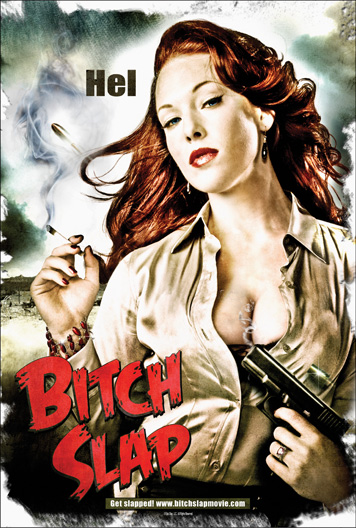 What was the idea you wanted to get across to your core demographic?
What was the idea you wanted to get across to your core demographic?
Rick: Smoking hot chicks kicking ass - and gritty fun. We’ve all been to DVD stores and seen bad artwork after bad artwork, and we didn’t want to fall into that trap. We didn’t want to be another one of those, “Wow, look how fucking bad this movie looks.”
Eric: They just pull out a couple of bad stills that they shot on set and try to make it work.
Rick: From its inception it was designed to be a guy’s movie. You know, we always joke that there’s not going to be a fraternity in the States that doesn’t have this in their DVD collection. And since then, it’s grown beyond that, but in its early stages we were swinging for the fences that this is just going to be a fun, outrageous guy flick, and its evolved into more of this girl-power film. So the women can embrace the girl power and the guys get all the eye-candy, so it was like the perfect world. We kind of nailed both demographics or at least that’s what we’re hoping for.
My partner, Tami, said that you compared your film to certain cult films; like Drag Strip Girls and Faster, Pussy Cat! Kill! Kill! Would you consider Bitch Slap to be an exploitation film?
Eric: I don’t think we set out to necessarily make an exploitation film, but it felt as if we were making one. It certainly pulled from a lot of different films, certainly those films are amongst some of the touchstone films, if you will, but you know, we also joked that this movie is Lawrence of Arabia meets Caged Heat. First and foremost, I think it’s a movie-lover’s film, and it’s absolutely an exploitation film. But I think it’s probably the first female-empowered exploitation film that I can remember seeing in a while. And when we were writing this film, Grindhouse had just come out and we were really excited to see it. We saw their promotional materials and thought, “Great! Wow, they’re doing exactly what we want to do.” Then we saw the movie and thought, “What happened?” They didn’t deliver on the promise the marketing campaign put forward. And so I digress, but yeah, we certainly consider one of the aspects of this movie to be an exploitation film.
So you didn’t write this as homage to exploitation films?
Rick: We just kind of backed into it more than anything else.
Eric: We just wanted to make a movie that we wanted to see. When we sat down to write we went “Okay, the perfect movie for us has not been in the market place for a long time. What would be the perfect movie for us that others (Hopefully!) would find appealing?
Rick: And again, we needed an easy sell, which is: beautiful women, action, violence and sex. It’s all those things. If Eric and I wanted to truly make the film we wanted to see - well we didn’t have the budget for that, you know, because we would have been…
Eric: Riding in spaceships and shit…
Rick: Well, yeah, but I certainly have other kinds of pet projects and I know Eric has his pet projects he’d like to do. So this was the right project for what we were doing for the time and budget.
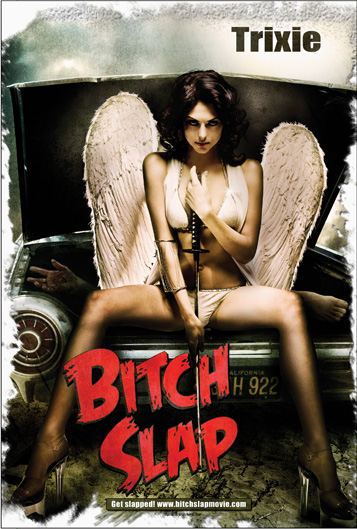 Independent films often have a difficult time selling in international markets and it sounds like your concerns seemed to address the international markets. How has Bitch Slap done abroad?
Independent films often have a difficult time selling in international markets and it sounds like your concerns seemed to address the international markets. How has Bitch Slap done abroad?
Eric: Extremely well. We thought that it would have a certain appeal around the world, but we didn’t think it would appeal to markets that are historically very hard to sell into or extremely conservative. We’ve sold this film to the Middle East, India, and numerous unadventurous territories. I think it’s because of the campaign and the promise of the movie that’s been delivered with the print campaign, website and trailer before they even saw the film. There is a market for this and I think the film itself ended up appealing more to European and Japanese distributors that it has here in the United States. Most films figure out what’s happening with the domestic, and then sell to the rest of the world. We ended up selling most of the foreign territories before we figured out the domestic distribution. Which is a little backwards.
Do you think that the studios would have marketed this differently in terms of the print campaign?
Rick: I don’t know what they would do better. Obviously, they’d have more money, and we’d be seeing billboards and materials on the sides of buses, but in the sense
of the artwork: the posters, the website - I don’t know what they’d do better.
Eric: In fact, we’ve heard from a couple of studio marketing chiefs through our agents that had seen our website very early on, and they actually said that very thing, “I don’t know what we would have done better.”
Sometimes the print campaign is tied to the audio-visual components (trailers, commercials). Did any thought go into that in terms of the look of the website or poster?
Rick: No, because we came to Greenlight before we started shooting. The look and the style of the film had already been decided. We knew it was going to be in the dirt, girls would be sweaty with this gritty, hard look. We knew we wanted that to translate into the artwork so there would be a united feel that tied all the marketing materials together.
You said you really liked the Grindhouse artwork. Was there any other artwork that served as creative inspiration for Bitch Slap?
Eric: I look at the Key Art Awards every year and see what’s happening in the marketplace, so if I see a standee, poster or a trailer that I really find striking, I’ll make a mental note of it. Both of us are lovers of film marketing, as well as films, so I think we came to it from a little more of an educated eye than the layperson would possibly do. But certainly, the Grindhouse marketing campaign was the most relevant to us at the time. For us, a poster should be simple, easy to digest and spark an emotional reaction from whoever is looking at it. I think people get the sex, violence and tongue in cheek nature in our poster. They get all that within the first second of viewing it, which is perfect.
There’s a sequel in the works. Do you plan on doing a second pre-release campaign?
Eric: Absolutely, we’ll create a teaser campaign and start to get people excited before we even start shooting.
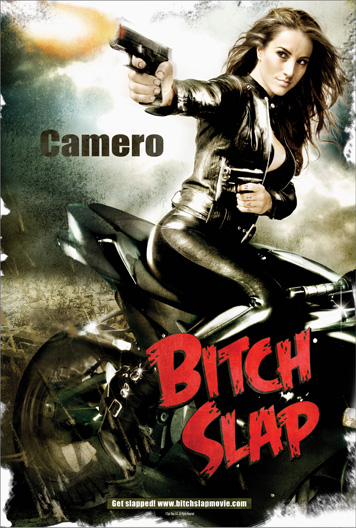 Are you going to keep the branding of the current artwork, or are you going to change it around?
Are you going to keep the branding of the current artwork, or are you going to change it around?
Rick: I think that’s going to depend on the tone and style of the new script. If we do Bitch Slap 2 In Space, that gritty kind of artwork isn’t going to feel right.
I think we’d probably want to stick with the current logo (title), but whether it maintains that gritty sort of feel – we have to see what the script will look like.
Eric: We’re looking at this as a brand, and building on the brand itself is important in that regard. I do think it needs to evolve, somewhat, but it should pay even the slightest homage to what was done before. It could be almost anything that just says sex and violence. Bitch Slap - wow go to space…or yeah, dinosaurs, whatever. Again, totally not sure what we’re doing, yet - but dinosaurs, yeah, those sell.
Rick: Cave women.
Eric: Exactly, cave women.
Rick: Get Raquel Welch…
Eric: I’d buy that…
Rick: Make it work.
Eric: Absolutely. We want the poster to be something that you guys can obviously hold up and say, “Hey, look, you know we were part of the next coming of Christ.”
That’s definitely on our wall.
Eric: That’s what we should put on top of the posters, ‘The second coming of Christ.’
The Christians would burn all the posters.
Eric: You can’t please everyone all the time, so we’ve learned.
Evidently.
Eric: I’m surprised that for all the people who’ve seen the film in various film festivals, we haven’t received any hate mail about the stripping nuns and stuff like that.
A friend of mine attended the Cannes and Toronto festivals. He said Bitch Slap was the buzz of both festivals.
Eric: That’s nice. We certainly heard that at Cannes. Toronto, I don’t think we heard that as much.
Is there a different fan temperament at the festivals than what you see at Comic-con?
Eric: Cannes and Toronto are completely different. Cannes is very sales and distributor based. Everyone told us not to be surprised when two thirds of the audience walks out after 20 minutes. They’re literally going from movie to movie so you can’t get upset about it. They’re just looking for what will sell in their markets. Our main screening had very few walkouts. It was at 10pm, we were two-thirds full, and had maybe 8 or 10 walkouts throughout the whole thing, which I felt was good. But Toronto was all fan based and our screenings were crazy. That’s who the film’s made for, anyway, so we weren’t surprised that they got it and had a good time. But we’re going to be at Stockholm, Athens, Glasgow, Fangoria, and Trinity of Terrors in Las Vegas at the end of this month.
When is Bitch Slap opening here in the States?
Eric: Opens theatrically in New York, Los Angeles and San Francisco January 8th, 2010, with Video On Demand shortly thereafter. Expect the DVD release sometime in March 2010.
Who picked up the DVD rights?
Eric: 20th Century Fox grabbed both DVD and Video on Demand. Freestyle Releasing has the theatrical.
Rick: And in a perfect world we are going to string out a series of midnight screenings across this great nation of ours.
Darryl Shelly is a partner at Greenlight Designs – an LA-based creative agency specializing in entertainment advertising.
Bitch Slap is in Theaters and Video-On-Demand January 8, 2010 –– www.bitchslapmovie.com
